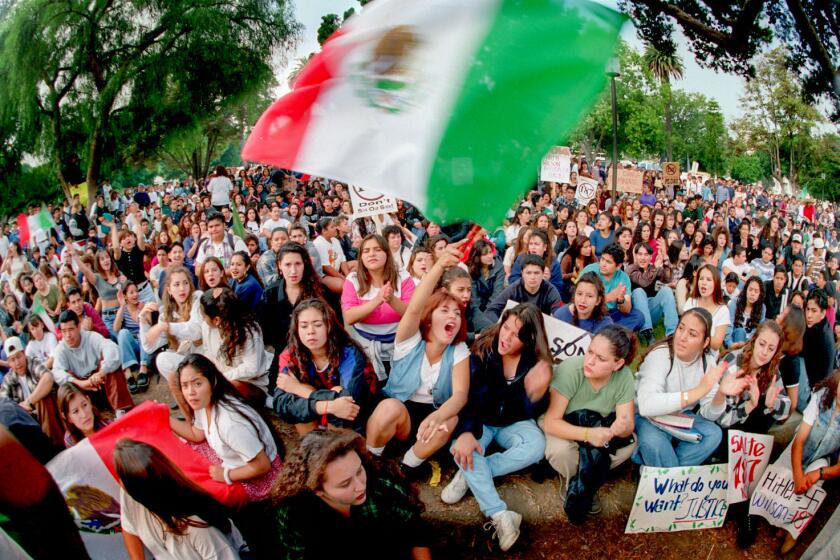
The film “A Day Without a Mexican” turned 20 this year, and its political message remains salient as anti-immigrant hysteria still reigns.
Directed by Sergio Arau, the mockumentary toils with the inexplicable disappearance of Mexicans across California, which prompts economic chaos due to worker shortages in various industries including construction, maintenance, farming, enforcement, education and more.
Before its 2004 release, a contentious promotional billboard in a Hollywood parking lot turned heads — “On May 14th there will be no Mexicans in California,” read the sign.
The student marches were the culmination of a month of anti-Proposition 187 teach-ins, debates, letter-writing campaigns and some of the largest protests California had seen since the Vietnam War.
“It sounded like maybe [Gov.] Pete Wilson was plotting a return to politics. But in fact, the ad was a promo for an upcoming movie that’s pro-immigrant,” Los Angeles Times reporter Steve Lopez wrote in 2004.
The billboard provided limited context for the film besides a web link, but controversy ensued among passersby who reported it as “offensive.” Hours later, the $10,000 sign was taken down out of fear that it would cause a riot, according to the filmmakers.
“People thought it was the Minutemen, the Ku Klux Klan,” Arau tells The Times, though he notes another targeted billboard ad in Spanish read: “On May 14, the Gringos are going to cry.”
Contrary to the public frenzy, the 2004 film was a response to California’s flurry of anti-immigrant rhetoric proliferated in 1994 by Proposition 187, which was backed by then-Gov. Pete Wilson. The ballot measure sought to establish a citizenship screening system and bar the undocumented immigrants in the state from accessing healthcare, public education and other social services.
Despite thousands of protesters marching to oppose the measure ahead of the election in 1994, it passed with a comfortable majority.
Arau, a political cartoonist and son of acclaimed director Alfonso Arau, complained to his wife and actress Yareli Arizmendi (“Like Water for Chocolate”) about the policy. She also appears in the film.
“I can’t stand this,” he told her. “Why are they so aggressive?”
As a Mexican foreign national living in San Diego, he felt attacked by the policy but he calls it the “detonator” for his creative endeavor.
Arizmendi, a byproduct of Luis Valdez’s El Teatro Campesino who views theater as a political tool, suggested they act against the xenophobic policy and create something that could demonstrate the economic value of migrants — namely Mexicans — in the state.
“She said we should do a day without Mexicans,” Arau recalled, and the idea stuck.
Arizmendi, who co-wrote the script with Arau and Sergio Guerrero, played into the xenophobic rhetoric amped by Wilson, whose campaign ads set off anti-immigrant hysteria.
“So let’s suppose we leave. What do you do without us?” Arizmendi said. “We already know [what would happen if we leave].”
The independent filmmakers received an advanced honorarium by the National Museum of Mexican Art in Chicago to fund and present their short before they made the feature, they said. “A Day Without a Mexican” went on to become a contender at multiple film festivals, including the Los Angeles Latino International Film Festival in 1997.
The 28-minute short showed the mixed reactions of various non-Mexican Californians who were suddenly confronted with their desire to rid themselves of Mexican immigrants. The film sarcastically thanked Wilson in the credit scene.
“It made a lot of noise at festivals,” Arizmendi said. “Everybody would say, ‘I’ve always wondered what would happen if we leave.’”
By the time that the independent short gained momentum at film festivals in 1998 — and the financial backing of A Televisa Cine to produce it as a feature film — the anti-immigrant ballot measure had already been shut down by a federal judge who deemed it unconstitutional under the Equal Protection Clause of 14th Amendment, which protects any individual regardless of citizenship status.
Still, interest in the film was increased as the years prevailed, with a 2001 L.A. Times article stating, “It’s too bad that a comedy film being developed in Los Angeles won’t be ready to screen when President Vicente Fox of Mexico meets with President Bush in Washington this week.”
Arau and Arizmendi rushed to finish their film, fearing that they would lose their relevancy in taking a stand on the delays of immigration reform.
“Bush was wanting to push immigration reform. And we were like, ‘Oh my God, we’ll be so late,’” Arizmendi recalls. “And of course, here we are 20 years later and it’s still happening and nothing has changed.”
Though the satire received mixed reviews upon its 2004 release, an L.A. Times planning editor called it “pure vanilla.” The film, which cost $1.8 million to make, still exceeded its financial expectations and earned $10.1 million at the box office.
Two decades later, Arau and Arizmendi are celebrating the film’s anniversary with a series of screenings across the country. The tour has opened their eyes to stagnant immigration policies and an anti-xenophobic rhetoric that remains long after Proposition 187.
“When we did a screening a month ago, someone called me a prophet,” Arizmendi said. “Because this is exactly what Trump is saying today.”
At the Republican National Convention, former President Trump promised unprecedented mass deportations.
“The Republican platform promises to launch the largest deportation operation in the history of our country,” Trump said.
A free screening of “A Day Without a Mexican” is set at LA Plaza de Cultura y Artes at 7 p.m. Saturday.
More to Read
The Latinx experience chronicled
Get the Latinx Files newsletter for stories that capture the multitudes within our communities.
You may occasionally receive promotional content from the Los Angeles Times.








